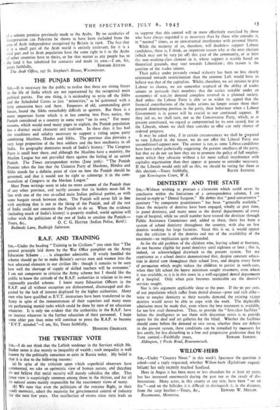THE TWENTIES' VOTE
SIR,—I do not think that the Leftish tendency in the Services which Mr. Barker notes is due merely to inequality of wealth ; such inequality is well known by the politically conscious to exist in Russia today. My belief is that it is due to the following reasons:
(a) In spite of the criticism upon which superficial observers have commented, we take an optimistic view of human nature, and therefore do not believe that social security will merely subsidise the idler. This latter view is surprisingly common among those in the thirties, and for all its naiveté seems mainly responsible for the reactionary views of many.
(b) We note that even the politicians of the extreme Right, in their caner moments, admit the necessity for governmental control of industry for the next few years. Our recollection of events since 1935 leads us to suppose that this control will be more effectively exercised by those who have always regarded it as necessary than by those who consider It, in "normal " times, as an unwarranted interference with personal liberty.
While the majority of us, therefore, will doubtless support Labour candidates, there is, I think, an important reason why at the next election (which may not be very far off) this part of the community, or at least the non-working-class element in it, whose support is mainly based on theoretical grounds, may veer towards Liberalism ; this reason is the position of the trades'unions.
Their policy under pnvately owned industry has been no less clearly orientated towards restrictionism than the extreme Left would have us believe was that of the capitalists. Whilst, therefore, we are anxious to give Labour its chance, we are somewhat sceptical of the ability of trades unions to persuade their members that the tactics suitable under an economics of scar:ity demand complete reversal in a planned society. And unless the Labour Party is able so to widen its appeal that the financial contributions of the trades unions no longer assure them their present dominating position in the party, their behaviour when a Labour Government is in power will be crucial to our continued, support. If they fail us, we shall turn, not to the Conservative Party, which, as at present constituted, we regard as compromised by its own record, but to the Liberals, whom we shall then -consider to offer cur only chance of ordered progress.
It may be asked why, if in certain circumstances we shall be prepared to vote Liberal in the future, we do not offer the Liberal Party our unconditional support now. The answer is not, as some Liberal candidates have been rather pathetically suggesting the present smallness of the party, but that we do not sec how they are to promote the policy of full employ- ment which they advocate without a far more radical interference with capitalist organisation than they appear at present to consider necessary. If the Liberals would only tell us this, we should be voting for them at




























 Previous page
Previous page